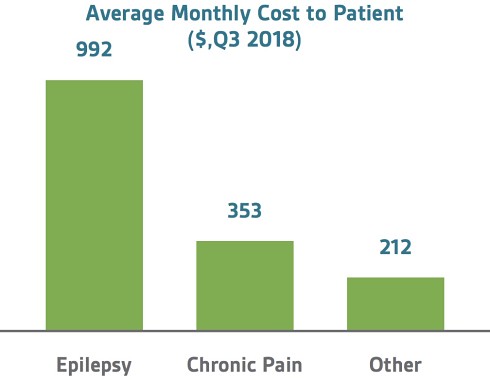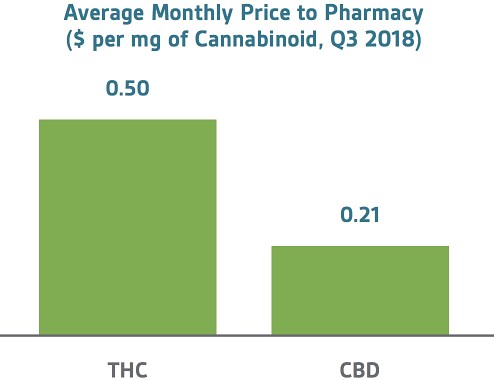Cannabis Access Clinics looks to aid Australian patient access to medical cannabis

Australia’s first medicinal cannabis pricing report has been published by Cannabis Access Clinics.
The theory behind medical cannabis is that it has the potential to soothe many of today’s ailments, with illnesses such as epilepsy, multiple sclerosis (MS) and post-traumatic stress disorder (PTSD) all in the firing line to be remedied.
The reality, however, is far less idealistic and must include aspects such as overall cost, patient qualification criteria and possibly most importantly, is this once forgotten medicine safe to be unleashed upon Australia’s population en masse?
The answer so far, is a tentative yes, although there is still a lot of work to do.
Medical cannabis investment vehicle MMJ Group Holdings (ASX: MMJ) has a stake in several medical cannabis companies, as well as 17.4% in Cannabis Access Clinics, which is Australia’s first network of healthcare clinics focused on helping doctors and patients navigate the regulatory pathway for prescribing medicinal cannabis products in Australian and New Zealand.
With multiple clinical studies ongoing around the world, including Australia, Bod Australia (ASX: BDA) has teamed up with Australia’s first network to expand its product range and reach.
Earlier this week, Bod reported its had received its first medicinal cannabis prescription from a Cannabis Access Clinics patient. Bod has also started a collaboration with Cannabis Access Clinics’ owners Biologics Research Institute Australia to study the effects of its MediCabilis product.
To date, almost all medical cannabis products have been sourced from Canada – possibly the world’s cannabis trailblazer having legalised medicinal cannabis way back in 2001 and cutting the red ribbon on recreational sales earlier this month.
Meanwhile, Australian doctors’ toolkits have also been given a boost with the recent easing of controls surrounding medical cannabis imports, namely by the Office of Drug Control (ODC) and Therapeutic Goods Administration (TGA).
The loosening of legislation has created a market opportunity for all sorts of companies and businesses including pharmacies, importers, growers, cultivators and, ultimately, Australian government coffers.
Medical cannabis delivery
Cannabis Access Clinics’ network is set to expand to Adelaide and Perth in the coming weeks having already established a presence in Melbourne and Sydney earlier this year.
According to Cannabis Access Clinics’ general manager Belen Gomez, the organisation wants to be one of the first parties to enter the fledgling medical cannabis market with the resulting effect being “free-falling” prices for patients and quite possibly, seeing far better health care outcomes compared to existing treatments that are all too often based on synthetic drugs, rather than natural herbs.

Cannabis Access Clinics general manager Belen Gomez.
Ms Gomez told Small Caps that “Medicinal cannabis is a relatively new treatment in Australia, and now through our national network of clinics, our doctors and researchers are in a unique position to start providing answers to questions as important, and as basic as ‘How much does it cost?’”
She also said that the network is looking forward to “undertaking a range of first-in-Australia research over the coming 12 months to benefit patients and clinicians.”
Cannabis Access says that its clinics work closely with both doctors and their patients to facilitate the delivery of medical cannabis therapies that are gradually proving to be beneficial.
That’s quite a far cry from the fear mongering that led to cannabis prohibition in Australia.
Ms Gomez also confirmed that Cannabis Access is committed to taking the straight and narrow path to medical cannabis commerce in accordance with TGA Guidance documents on medicinal cannabis.
Cannabis Access has staffed its centres with GPs and specialists that are able to provide consultations to patients with complaints including chronic pain, chemotherapy-induced nausea, MS, PTSD, anxiety, insomnia, epilepsy, HIV, AIDS and even patients requiring palliative care.
The proof in the pudding
As part of its mission to ensure the network serves patients with suitable services (and at suitable prices), Cannabis Access carried out an extensive study into the cost of medical cannabis treatment for Australian patients – the first of its kind in Australia.
In its report titled Australian Medicinal Cannabis Pricing Analysis published today, the network’s research has revealed several interesting insights into the evolution of medical cannabis treatments in Australia.
As expected, the number of legal products available to doctors has increased more than threefold since the TGA relaxed regulations on the import of medical cannabis products in February 2017.
Another knee-jerk effect has been slashed prices with entry-level product prices falling by 47% in 18 months.
Possibly the most surprising conclusion made by the report’s authors is that Australian medical cannabis users are on average paying around A$372 per month – that’s around 25% higher than prices being charged by black market illegal street dealers.
The product quality is understandably far better and far more reliable from bonafide Canadian growers than it is from unregulated shady dealers.

Meanwhile, severe epilepsy patients can expect to fork out almost $1,000 per month, due to the higher dosages typically required for their needs.
The steep prices currently being charged are expected to decline over the coming 12-18 months as a host of companies compete to deliver better quality products at lower prices.
“Prices paid by many patients fall within the limits of what is considered affordable. We expect product prices to continue to trend downwards, as more players enter the market and more streamlined, efficient supply chains are established,” according to Cannabis Access’ research team.
Cannabis Access says prices are expected to continue to decline as more players enter the market with its medical director Sanjay Nijhawan stating that the conducted research “helps to introduce more facts into patient conversations.”
According to one satisfied patient, Warren Schell, 70, from Sydney, “medicinal cannabis is not covered by the PBS so compared to my other medications I have to pay a lot, but the costs are not as high as I was expecting, compared to the incredible benefits.”
Maiden market and space capacity
Research shows that the number of products made available for doctor prescription has increased more than threefold since February 2017, from 11 products to 35. The number of suppliers has also increased from three to 11.
“On average, price per milligram for oil-based cannabinoids has dropped 11% over the past 12 months, to $0.30 per mg. More importantly from a customer perspective, the floor price (the lowest priced product in the market) for cannabis oils has fallen drastically by 47.6% to $0.10 per mg for a CBD only product, suggesting that increased competition and volume are driving prices down,” according to the Cannabis Access report.
There is further differentiation in terms of the type of cannabinoid. Patients are paying much higher sums for tetracannabidiol (THC) than they are for CBD derived products.

Psychoactive THC is currently fetching $0.50 per mg, on average, while non-psychoactive CBD costs less than half, at $0.21 per mg on average, “presumably reflecting a lower cost to produce the less restricted CBD-based products,” the report stated.
In terms of commerce, Cannabis Access says that there are already clear winners from the recent easing of cannabis laws in Australia.
Pharmacies, the places from which medical cannabis products are dispensed, have been found to be marking up products by an average of 26% and by as much as 140% depending on the product.
For the time being, patients are being given access to five different delivery mechanisms for the medical cannabis being prescribed. Depending on the recommendation of their doctor, patients can either receive oral capsules, ingestible oil, an oromucosal spray, ground/milled or sparse plant material.
As a sign of the times and further highlighting just how quickly science fiction is becoming science fact – patients can now receive telehealth consultations conducted via video-conferencing, with a diagnosis given in minutes, removing the need for torturous journeys, especially for patients most in need.
